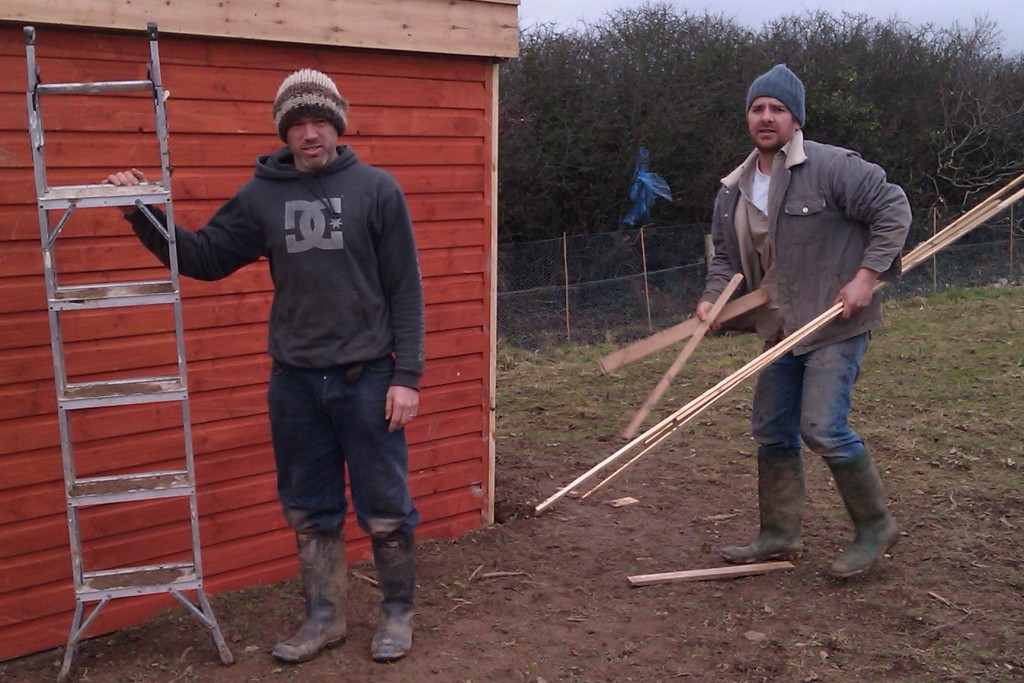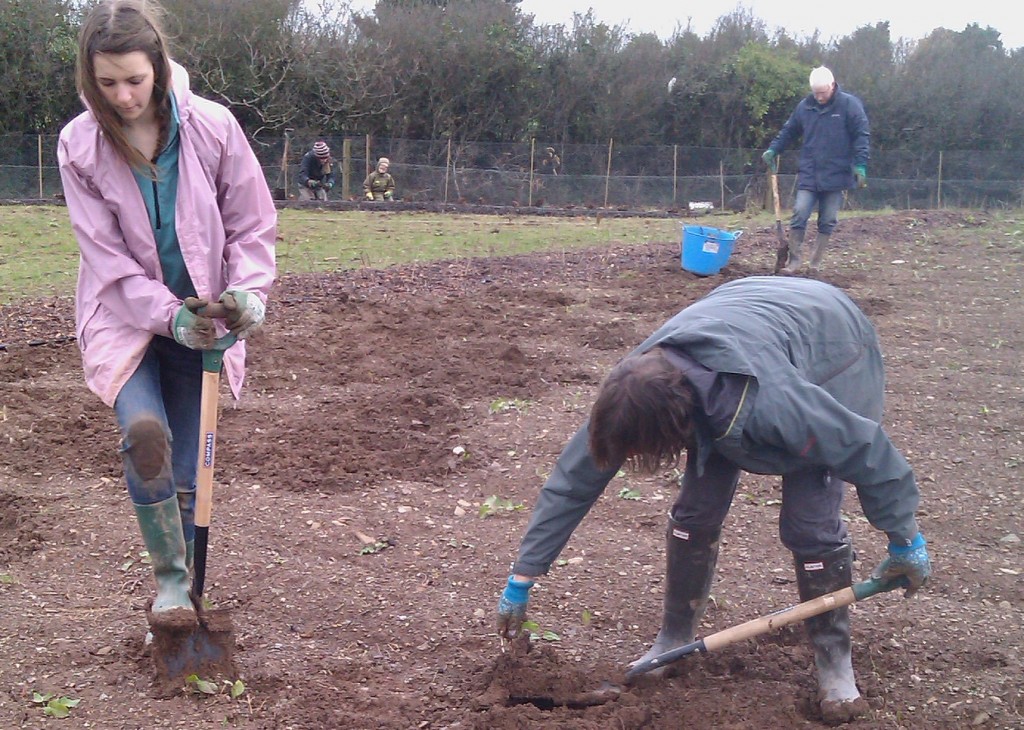
March 29, 2011
Camel CSA enjoyed an energetic day out at the WWOOF (Willing Workers On Organic Farms) south-west regional gathering at Bosavern Community Farm just outside St Just-in-Penwith.
Bosavern Farm is rented from Cornwall Council by the Lands End Pensinsula Community Land Trust.
Volunteers are growing vegetables and keeping hens, led by community farm trainer Hugh Taylor. Their produce is sold at the farm gate, in shops in St Just and at Pendeen Farmers’ Market.
The 38-acre organic farm is situated just inland from Cape Cornwall on the toe of Britain, only a few miles from Land’s End. It’s able to produce quite a lot of over-wintered, early crops in the mild climate but also suffers from the wild Atlantic weather.
The event provided an opportunity for Camel CSA and Bosavern to share their growing experiences.
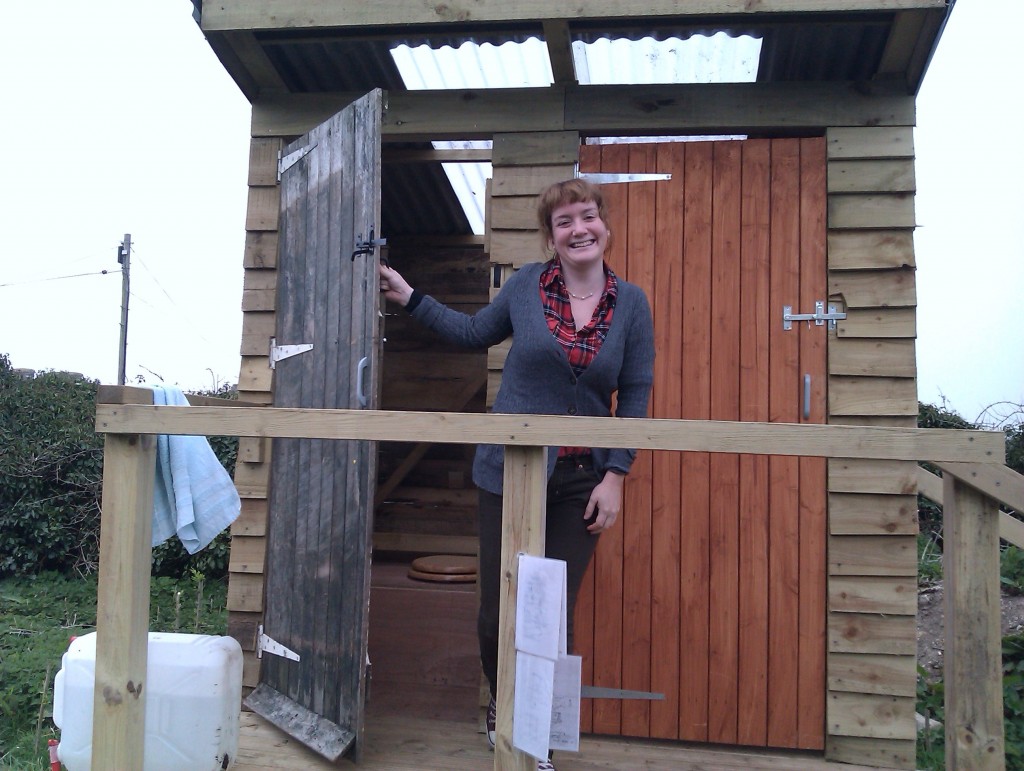
Highlights of the day included testing the tree bogs (compost toilets), joining the farm tour, exploring the polytunnel and participating in some group work led by Bosavern’s volunteer growers. Around 15 of us dug out two onion beds in hazy spring sunshine.
A big thank you to everyone at Bosavern for extending such a warm and friendly welcome to us.
You can follow Bosavern Community Farm’s seasonal progress on Hugh Taylor’s blog.
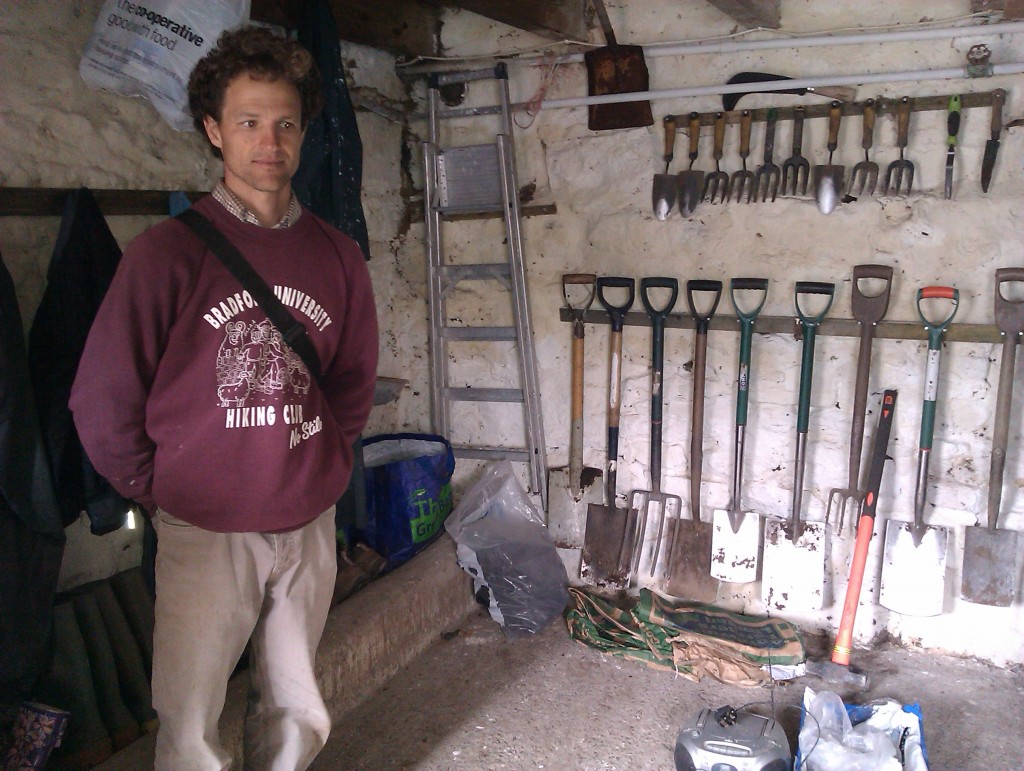
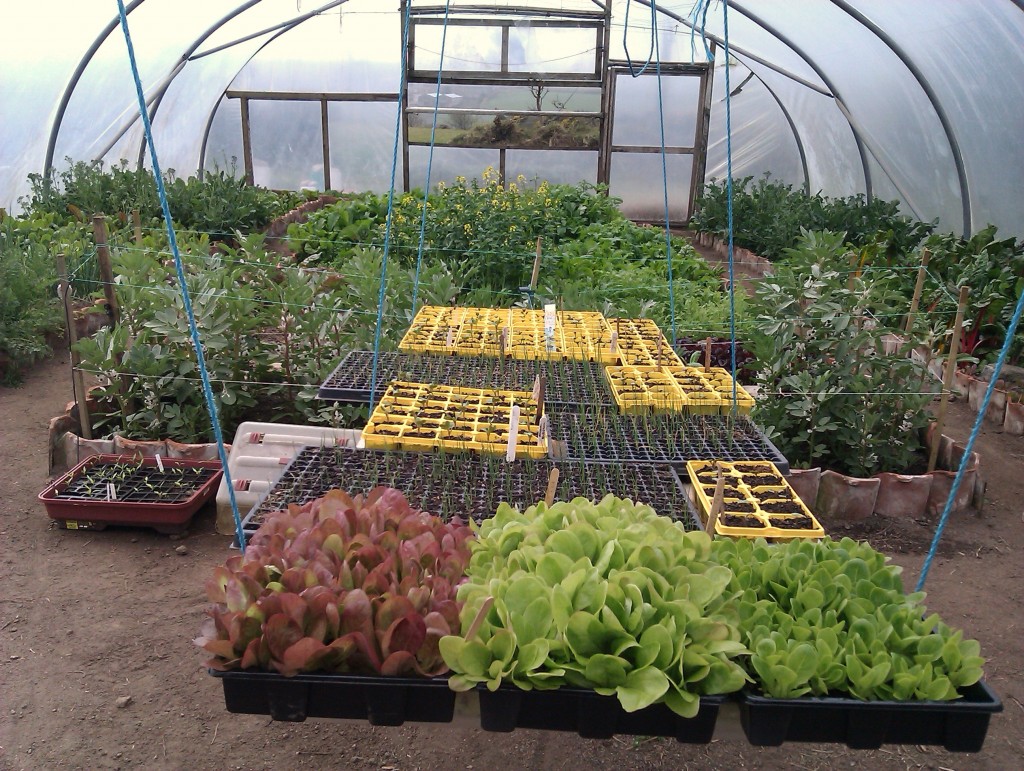
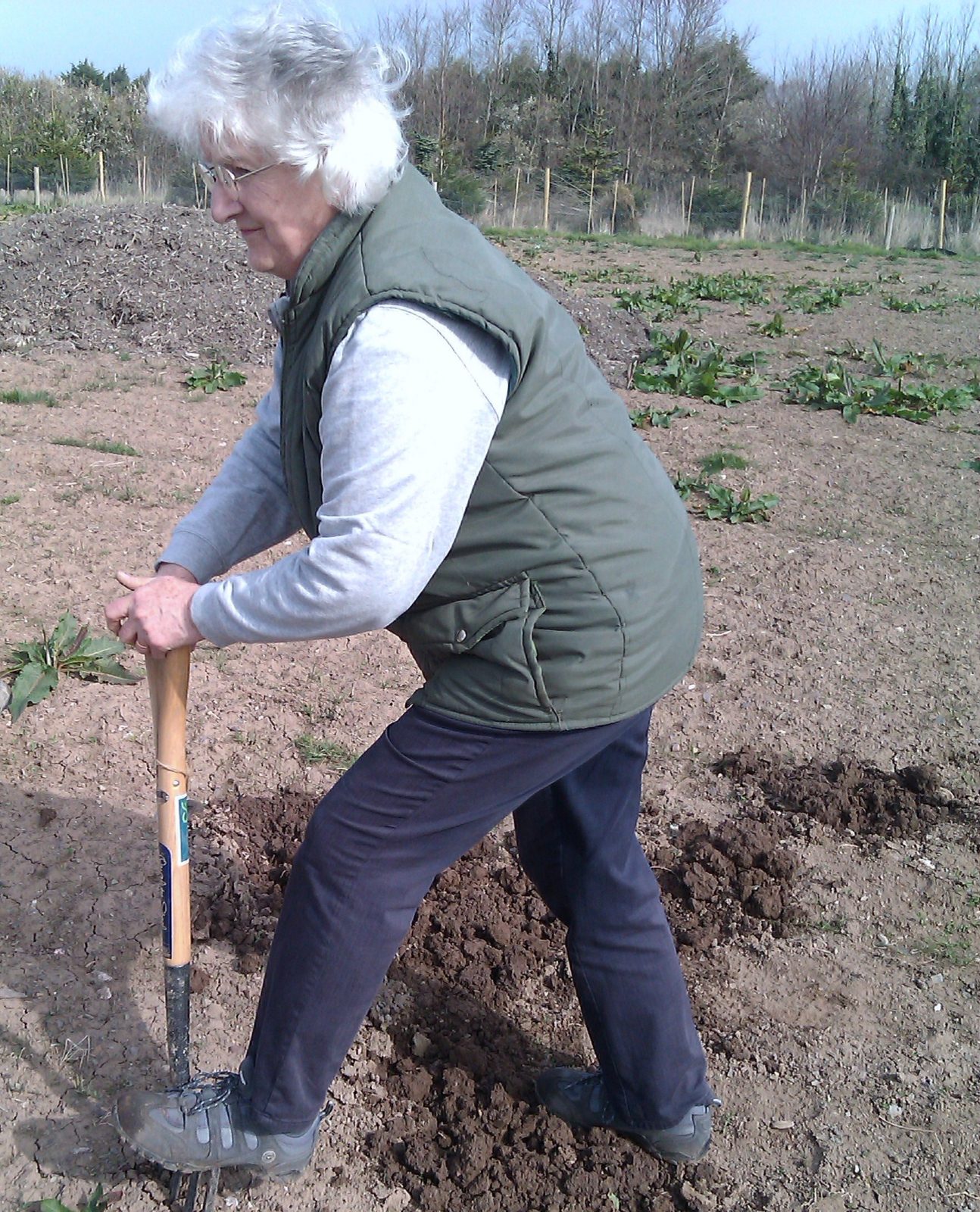
March 25, 2011
The onslaught on the dock weeds continues. Picking and packing team members helped out expert grower Mark Norman after he spent four solitary hours digging up the worst of them.
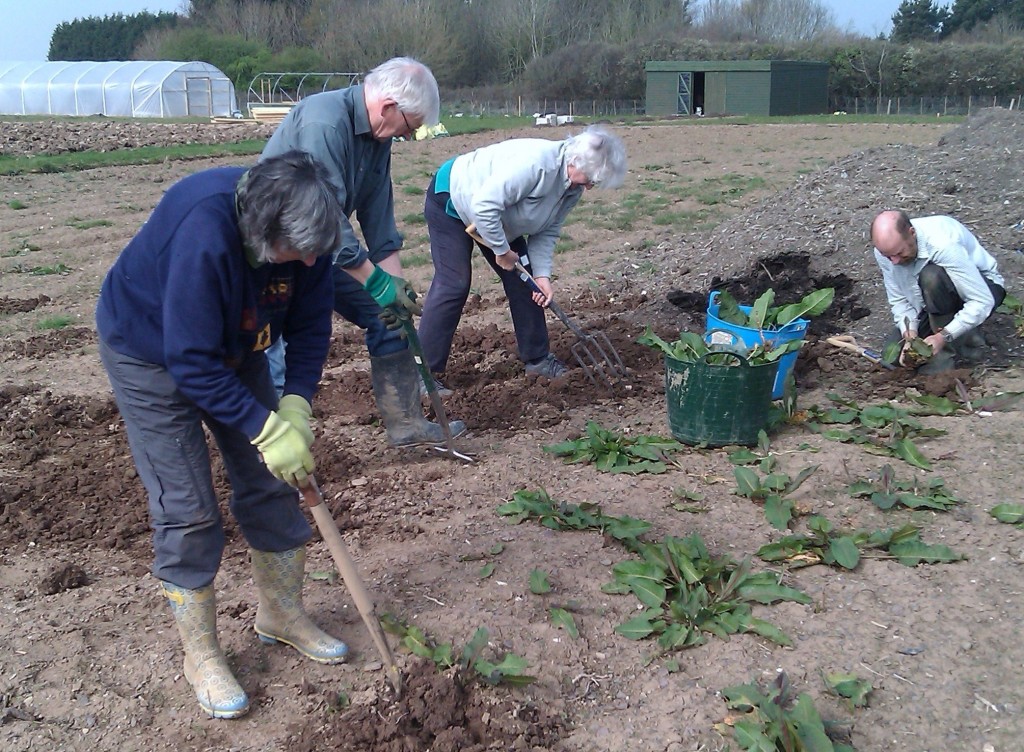
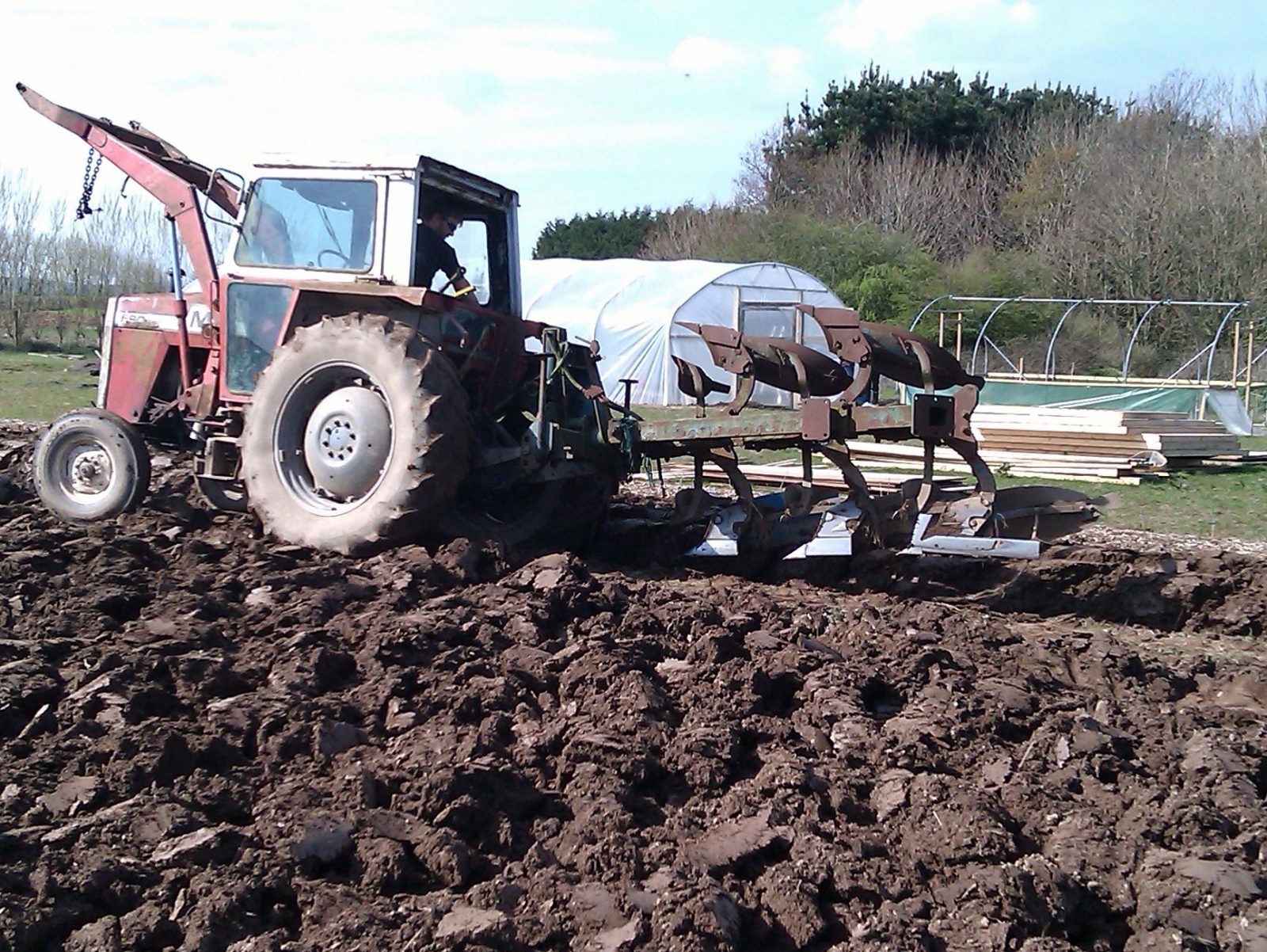
March 21, 2011
Camel CSA’s growing team continue to prepare the veg beds and sow seeds on our community veg plot.
Expert grower Jeremy Brown has ploughed one side of our two-acre plot in preparation for the sowing of alliums, roots and legumes. The first seeds in the ground will be broad beans, shallots and onion sets.
The soil in the first polytunnel has finally been dug over. It can now be rotavated before we plant early salad crops, carrots, beetroot and french beans.
Our volunteers are still valiantly trying to dig out all the dock weeds. This is not a popular task.
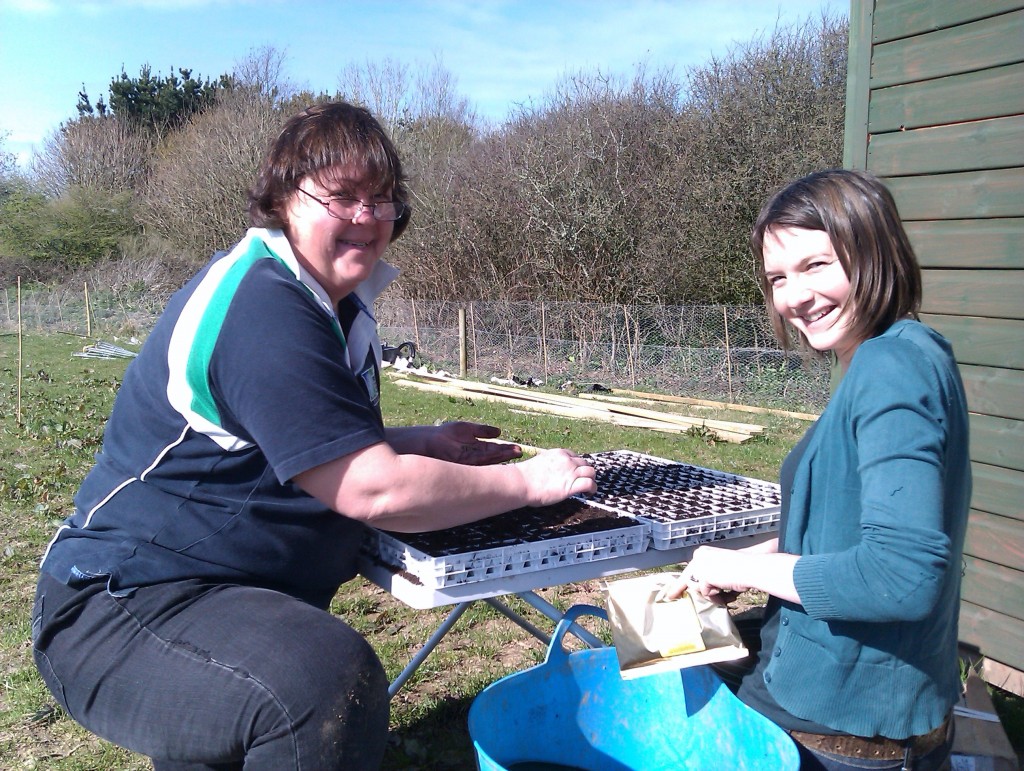
More jobs
The team’s also been sowing additional seeds in modules – salad rocket, canary yellow and blood red leaf beet, multi-coloured and silver Swiss chard.
Thank you to this Sunday’s volunteers – expert growers Jane M and Jeremy B, plus Charlotte, Danny, Mary and Mike S.
Over the next few weeks there’s plenty more jobs to tackle. The seeding tunnel needs covering, the potting shed is awaiting construction, the second large polytunnel is ready to be erected.
And – sigh – there’s hundreds more of those damned docks to dig up…
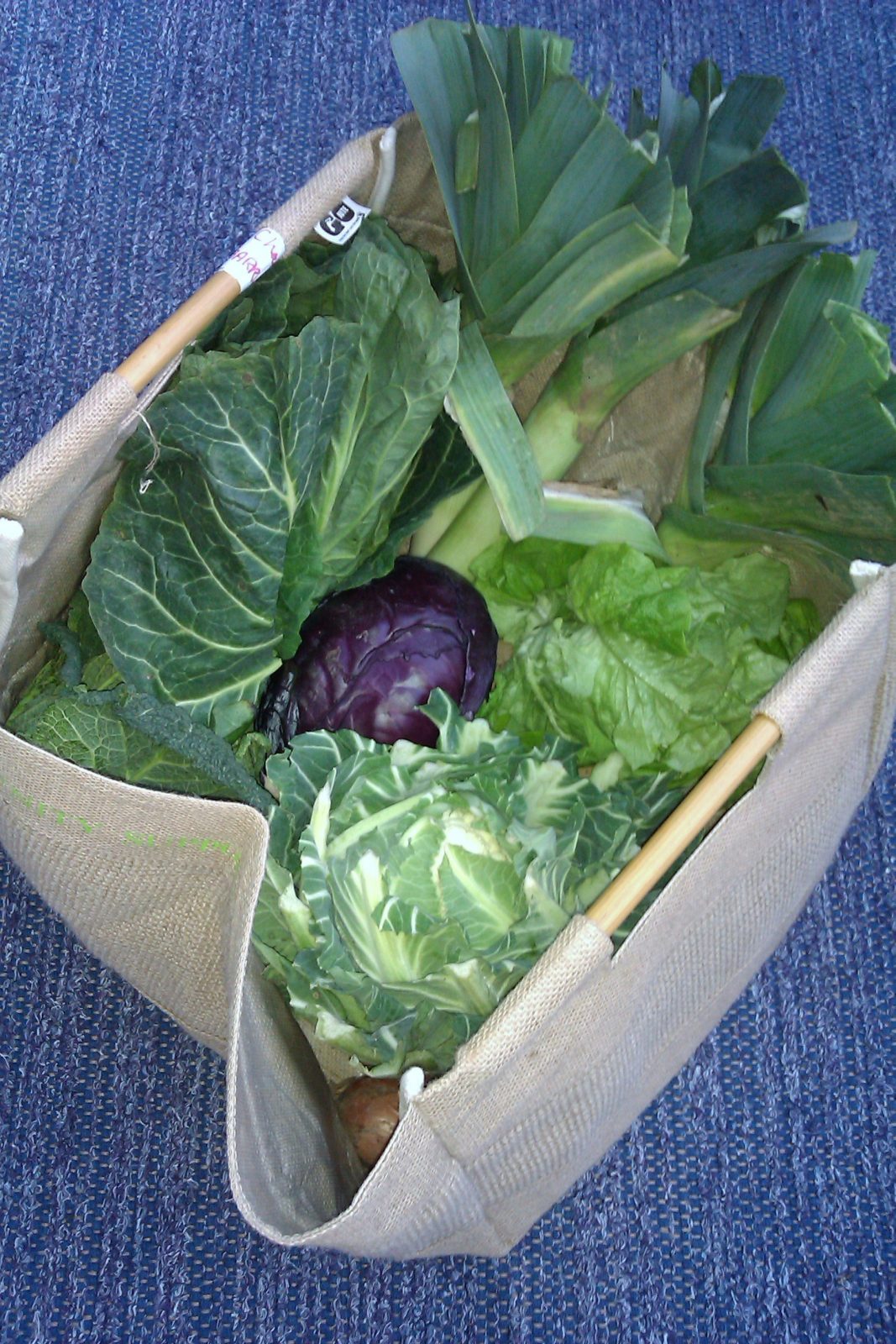
March 16, 2011
We’ve marked Fairtrade Fortnight with the launch of our new carbon-zero standard-size veg hampers. This follows a lengthy search for sustainable veg box containers.
After a successful trial, we’re now offering these biodegradable jute hampers to our members. We’ve purchased them from GoJute, a local firm based in St Austell, which operates to strict ethics.
Our new membership secretary Cath Simmons says:
These hampers will replace the assortment of boxes that are used at the moment. They’ll make the picking and packing sessions a lot more efficient as well as being very practical and good-looking. They’re lined and have sturdy bamboo handles.
As soon as we receive your order, your next weekly veg share will arrive in your new hamper.
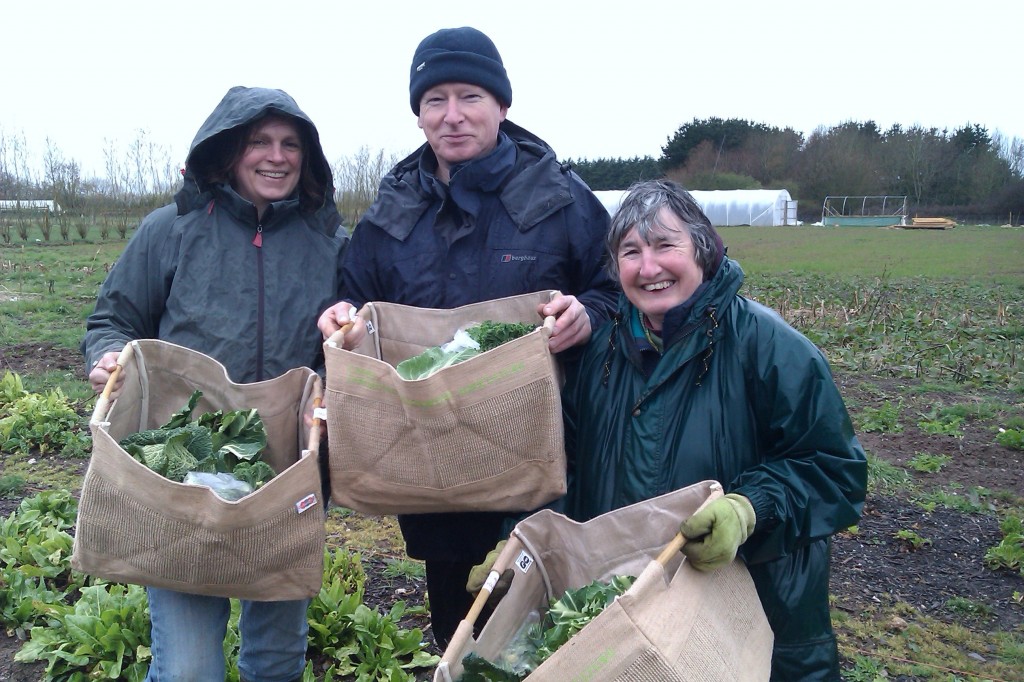
The bags are available to standard box customers for the cost price of £5.95 each, or two for £11.90. It’s a returnable deposit, provided the hampers are handed back to us in good condition.
Members will be able to leave an empty bag in the packing shed for when they pick up their veg the following week.
Small vegetable box customers will get this offer at a later date. Regrettably, our consignment of small jute hampers is stuck on the high seas after a maritime collision (you couldn’t make it up!) on the voyage from India.
We’ll keep you posted.
Jute suits – bags replace veg boxes – Cornish Guardian
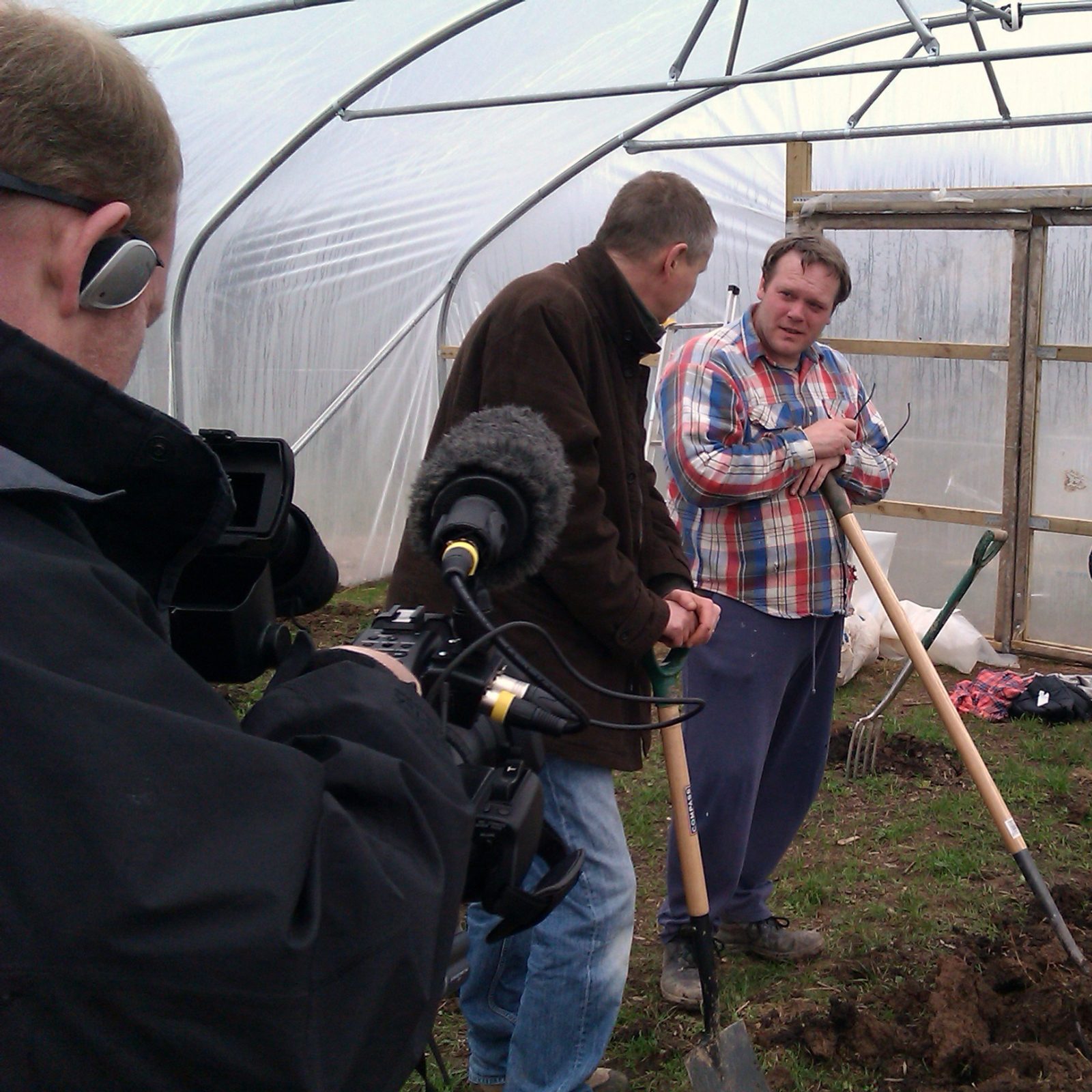
March 14, 2011
We’ve lots of activity to report from our community veg plot at St Kew Highway in north Cornwall.
- BBC Inside Out South West has been to film us about initiatives to keep rural communities alive.
- We’ve begun digging up the ground inside the newly-covered polytunnel so we can sow early carrots,
French beans, beetroot and salad crops. Cold frames are also under construction. - We’ve planted two rows of Jerusalem artichokes, sown additional salad leaves in modules and pricked
out the parsley seedlings. - We’re continuing our onslaught on the dock weeds in the brassica beds.
Not bad for a mixed bunch of volunteers! Thanks to Bob, Bridget, Charlotte, Gav, Jane, Kitty, Mark M, Mark N, Mike S, Sophie. Also veg box packers Anne, Jenny, Penny, Robert, Trish, and Max (aged 5).
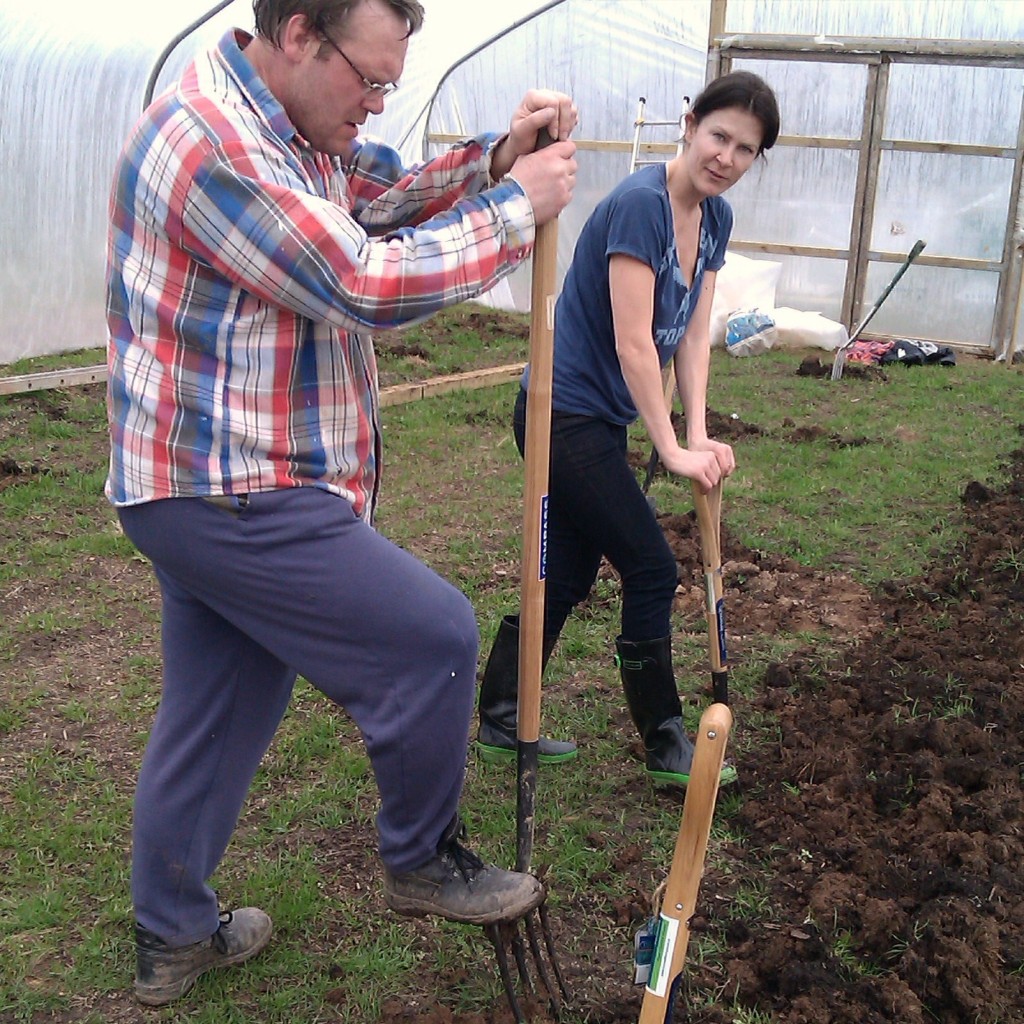
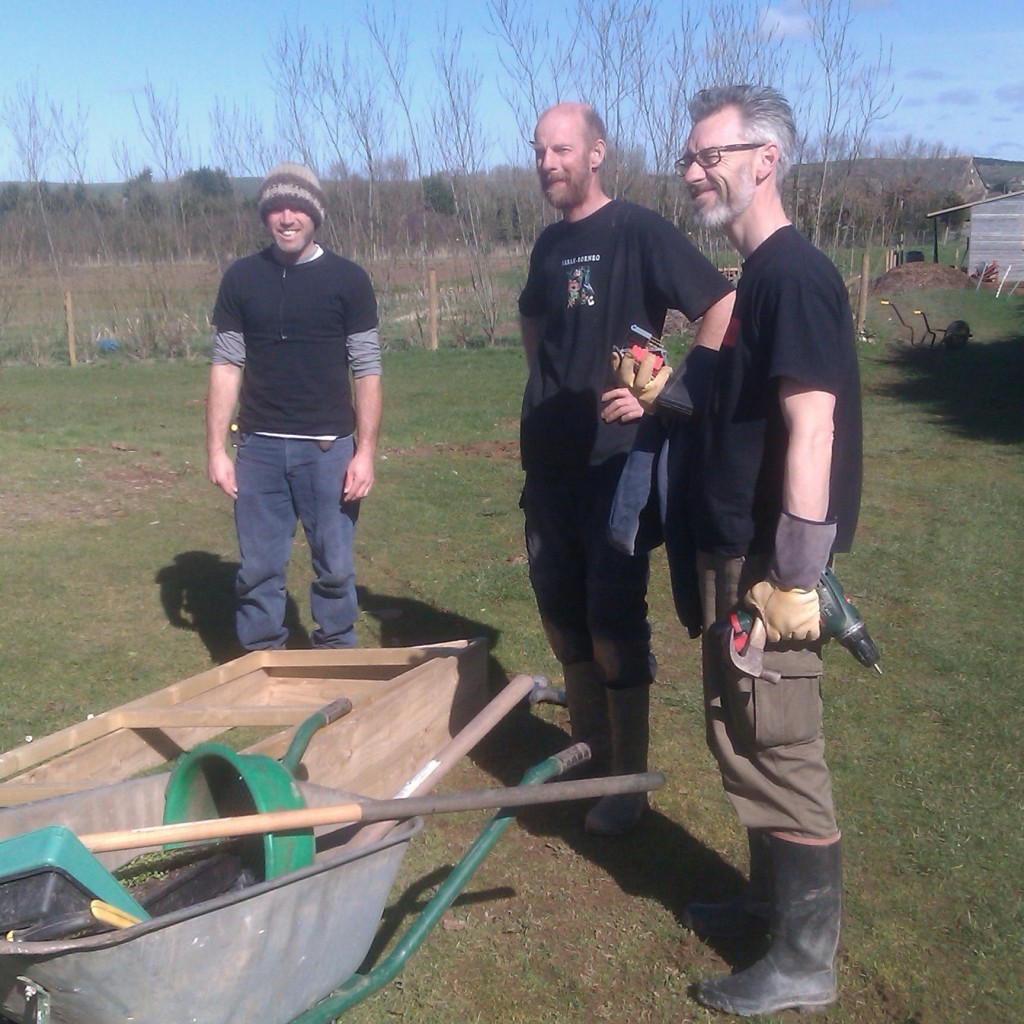
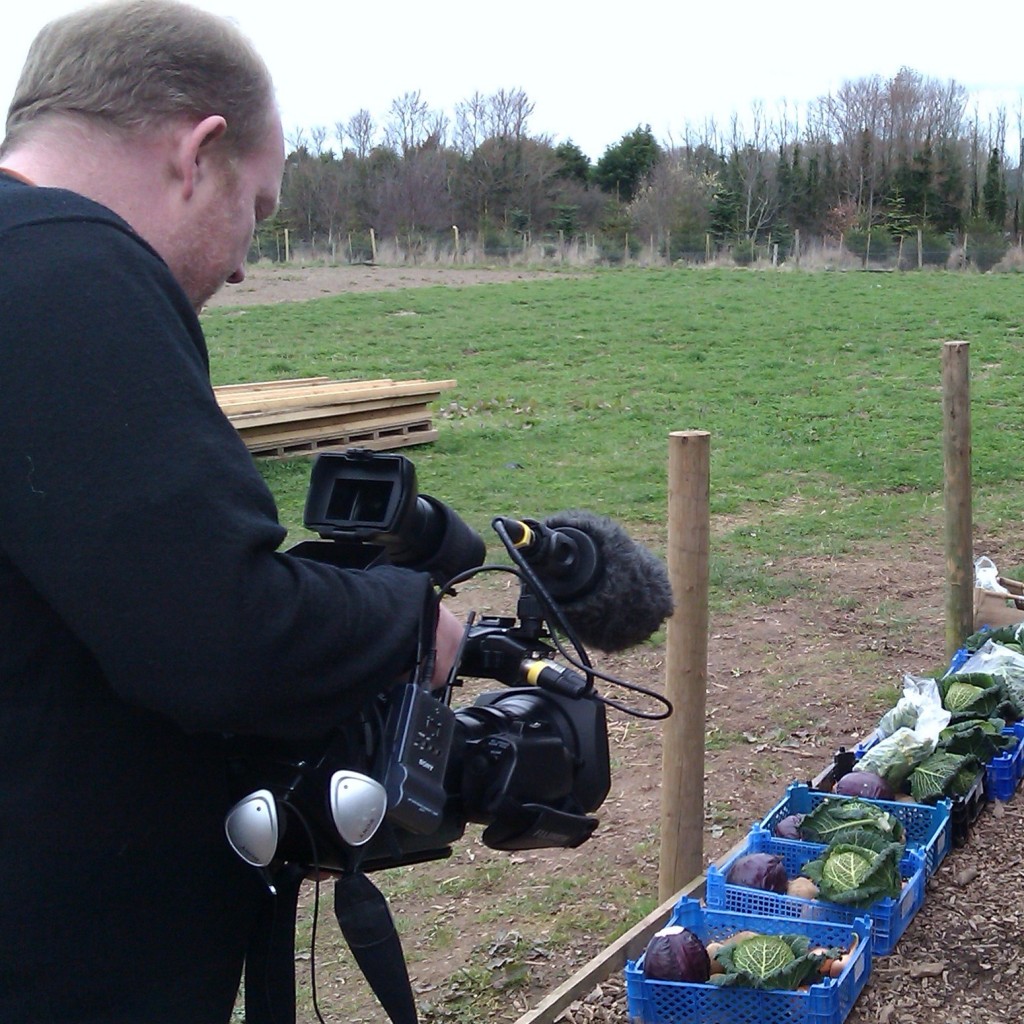
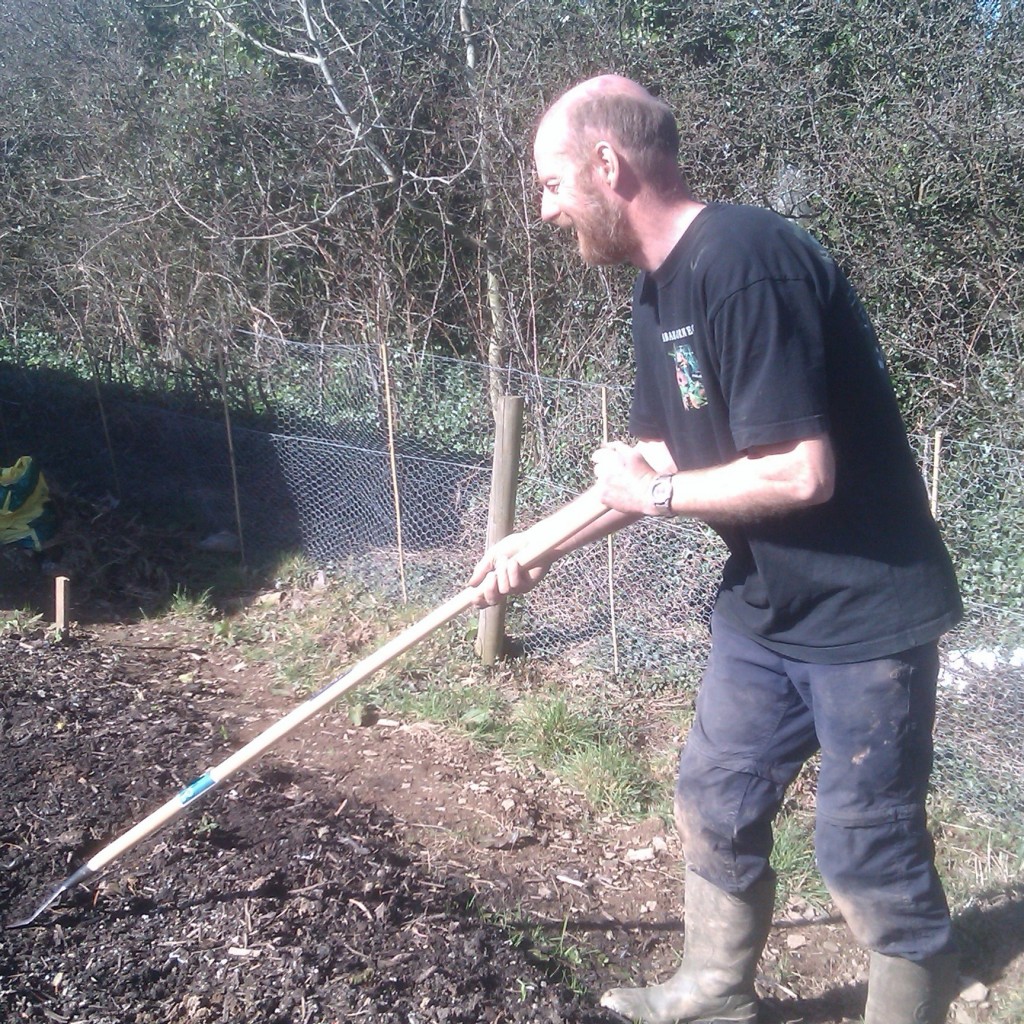
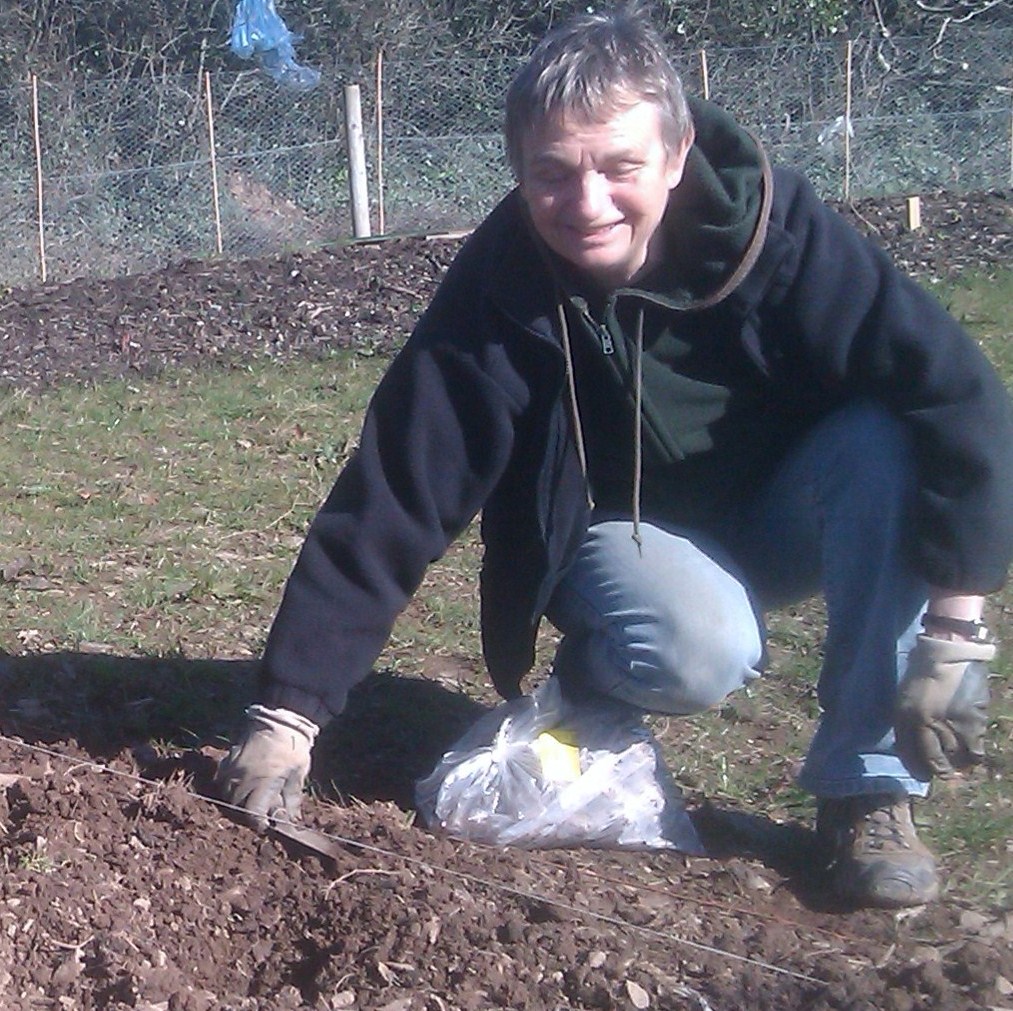
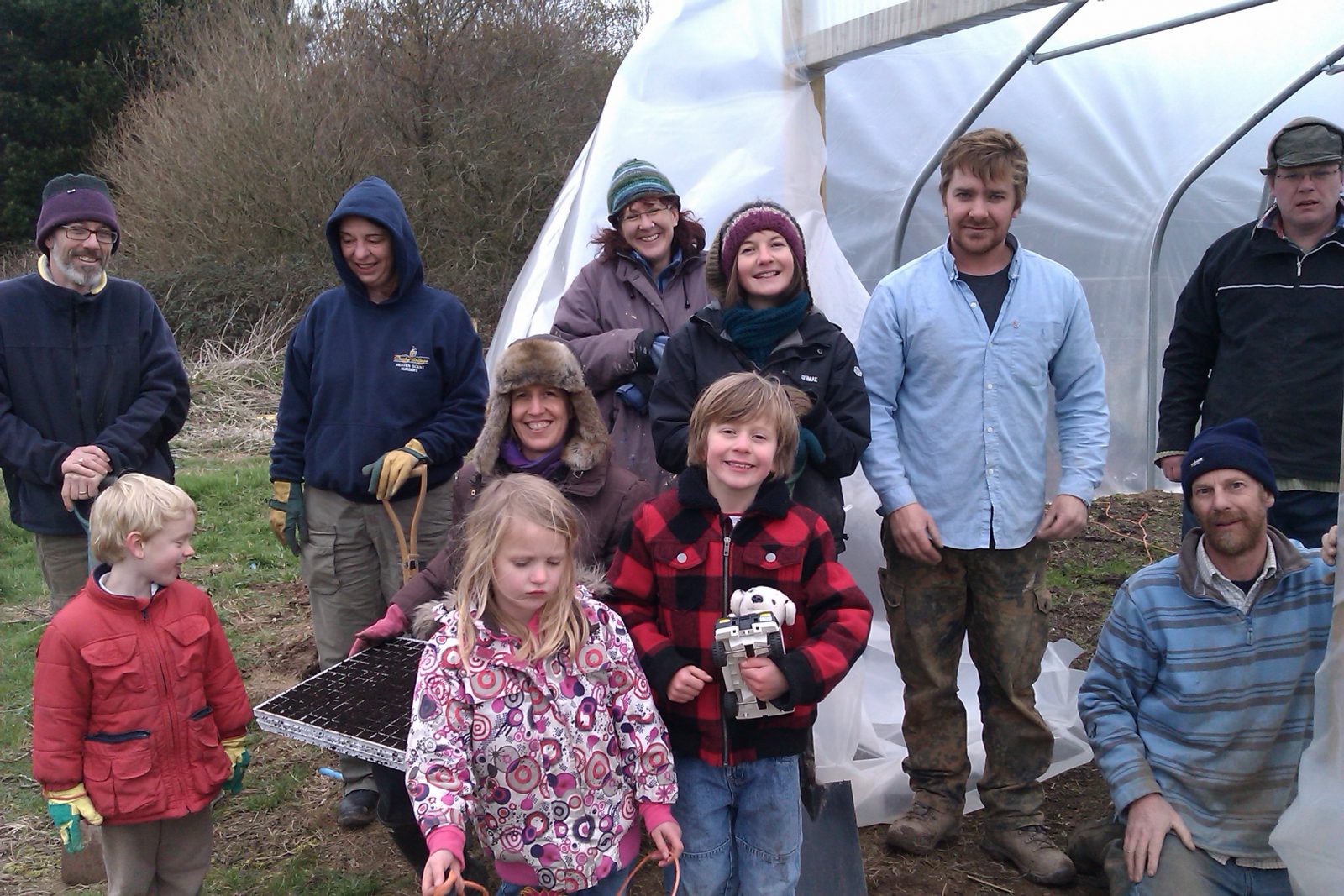
March 7, 2011
Camel CSA’s growing team has got the cover on the first of our three polytunnels. At long last we can start planting the early carrots, beetroot and salad crops.
A HUGE thank you to the volunteers who braved grey skies and a biting easterly wind to get the job done.
Expert growers Jane, Jeremy B and Mark N led team members Bob, Bridget, Cath, Charlotte, Danny and Mark M plus Finn (7), Keira (5) and Max (5).
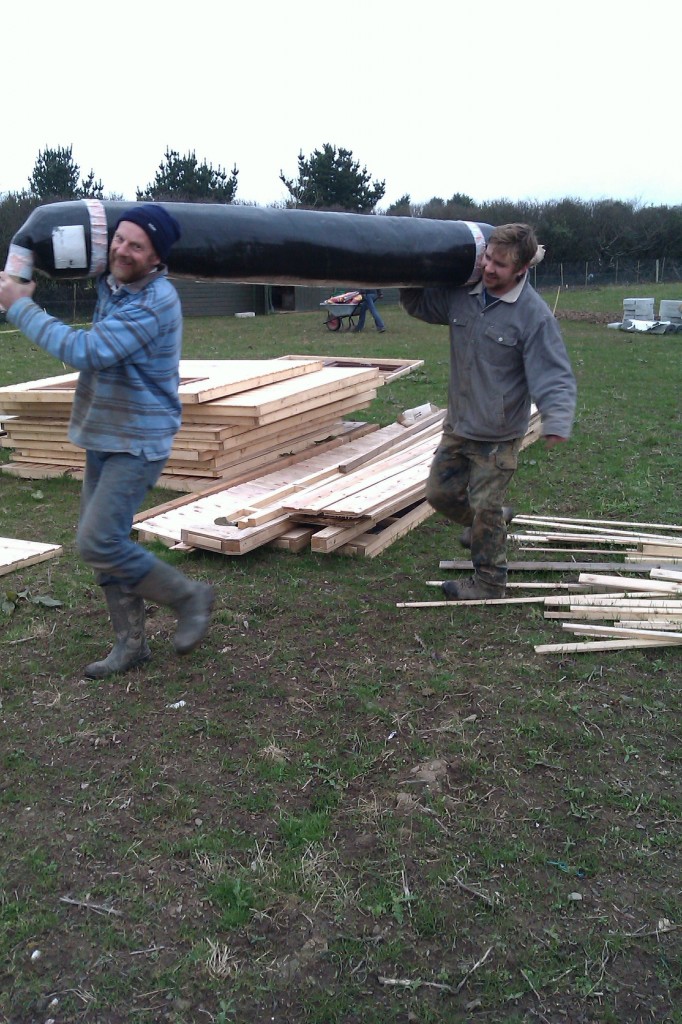
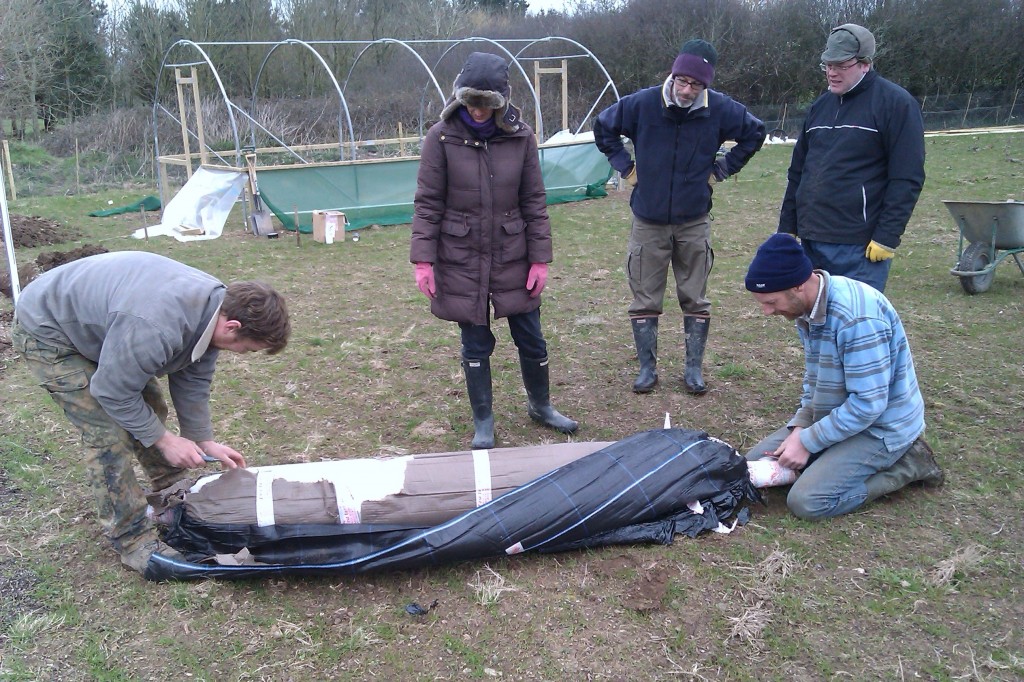
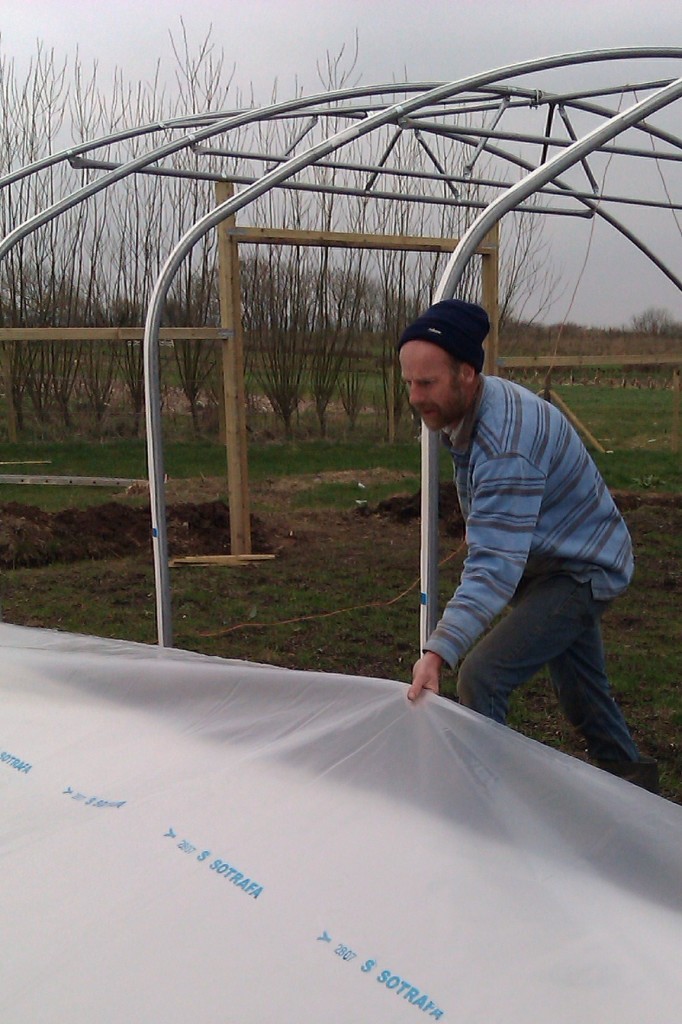
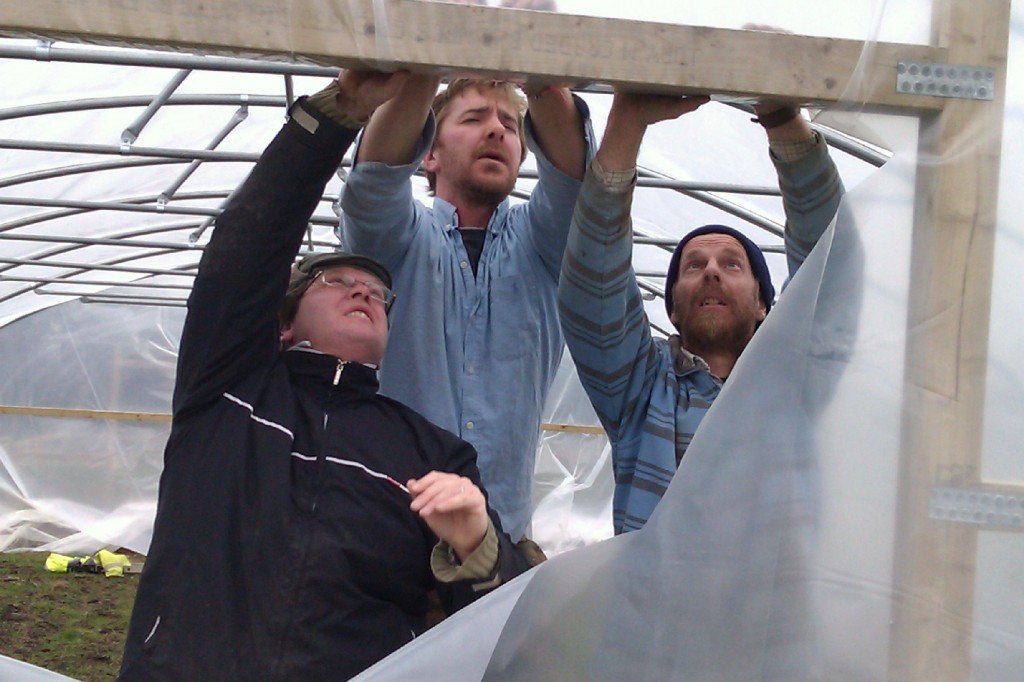
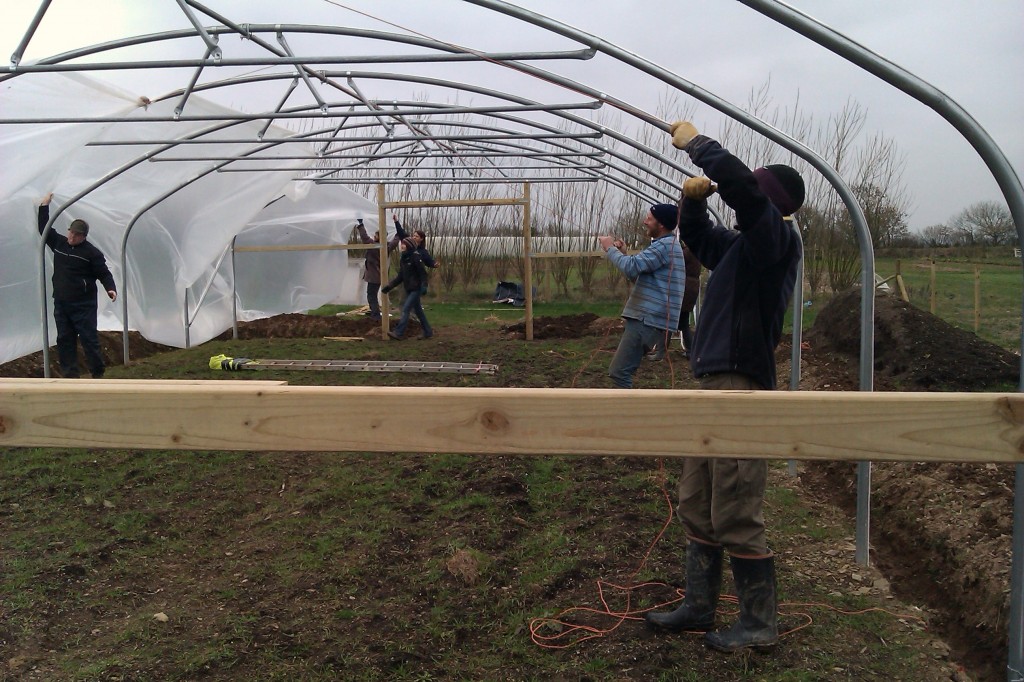
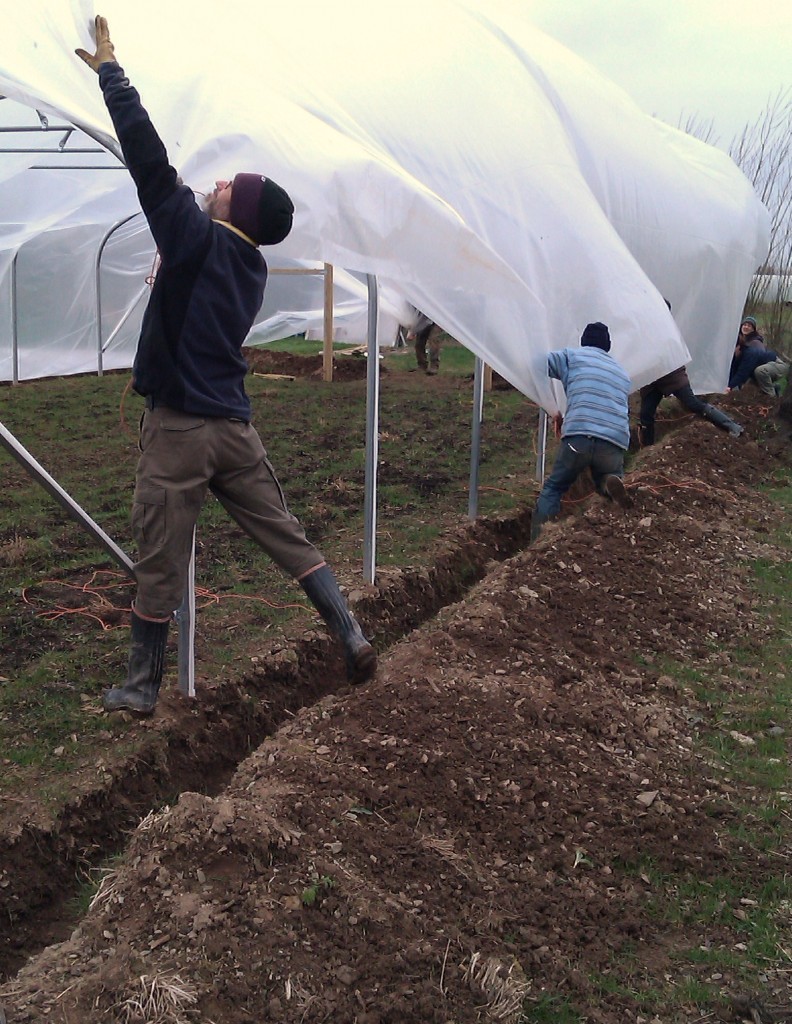
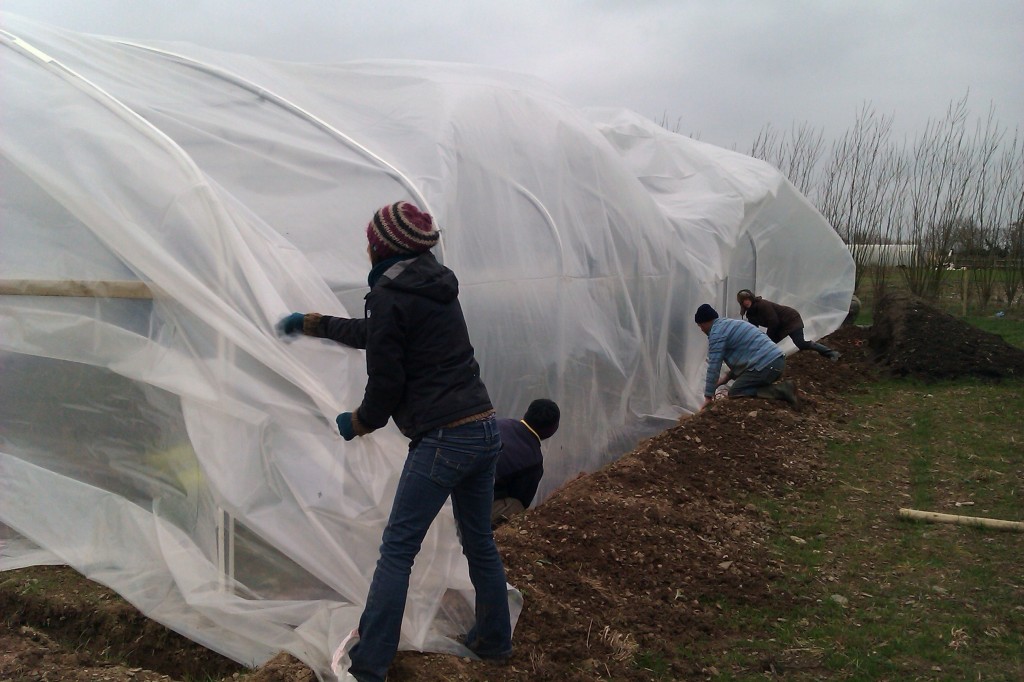
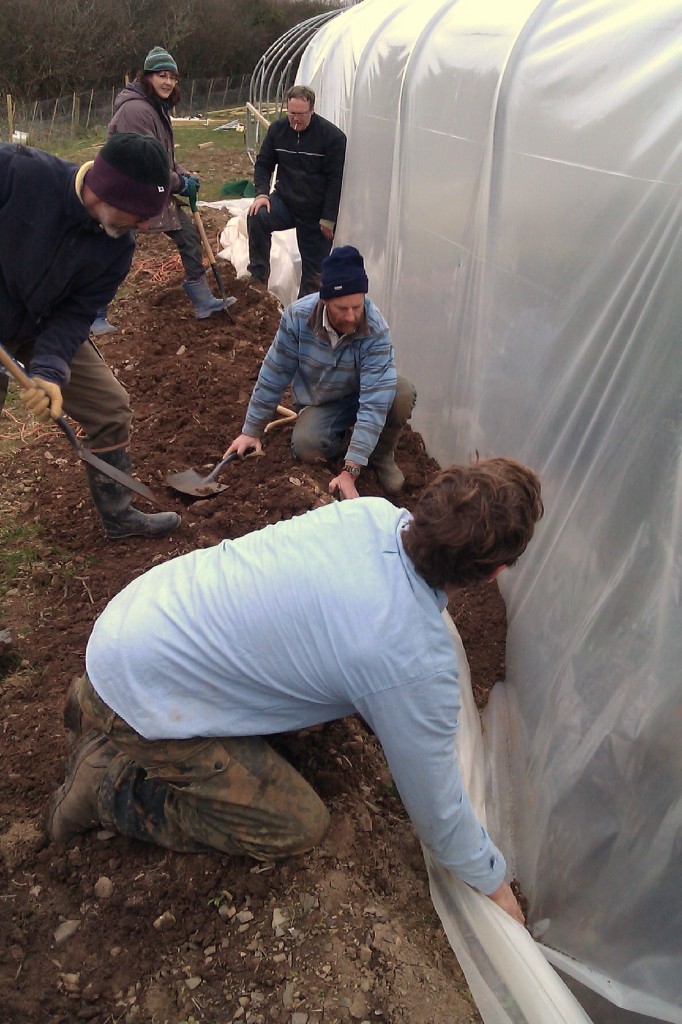
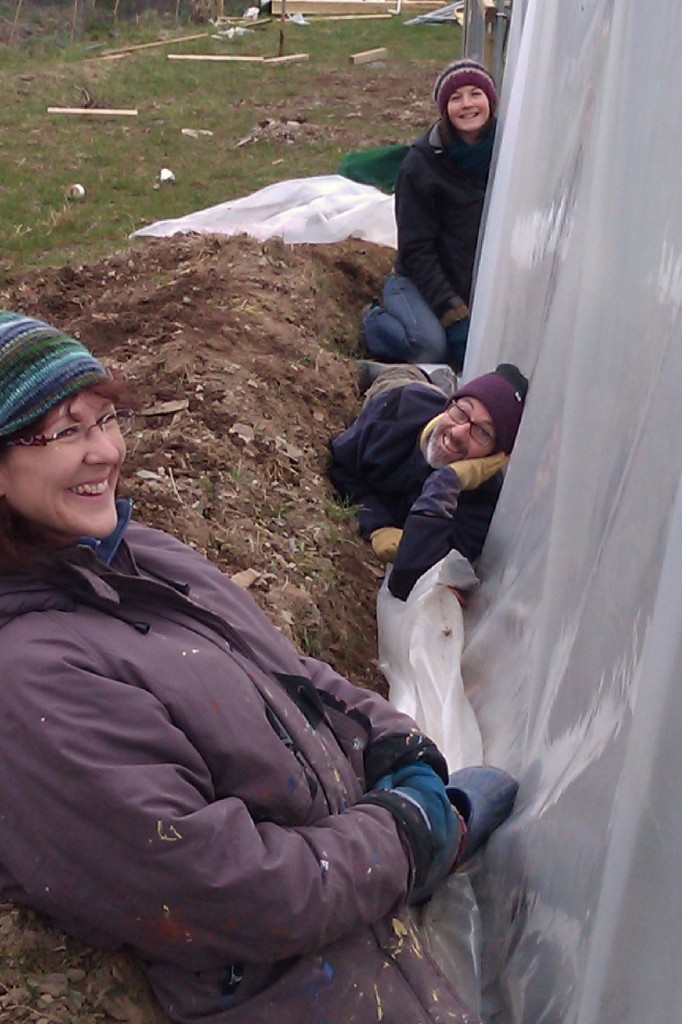
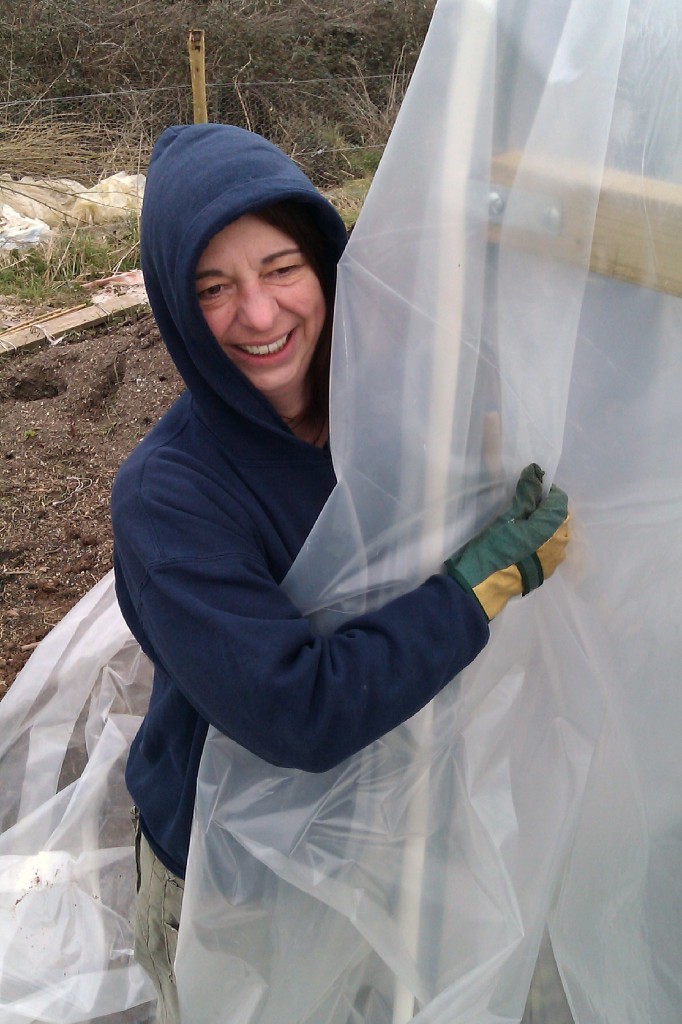
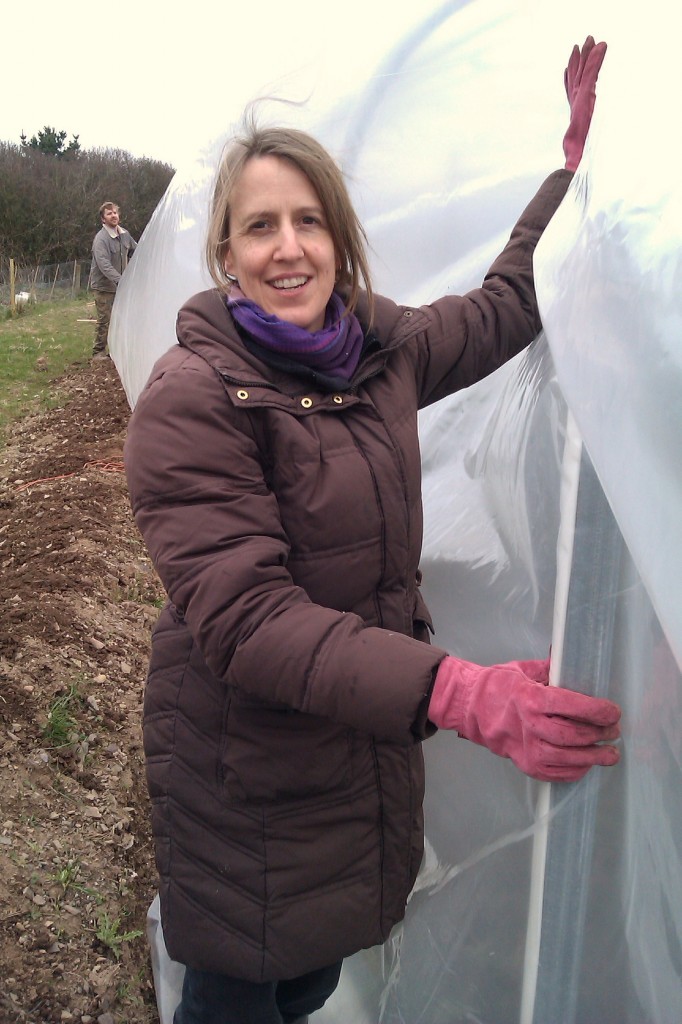
March 6, 2011
Jerusalem artichokes are a staple item in Camel Community Supported Agriculture’s weekly veg boxes at this time of year.
Unlike late winter brassicas, which are in short supply all over the UK, these knobbly roots seem to thrive in hard, frosty conditions. Our growing team are about to plant a new permanent bed of them to sustain us in future seasons.
Jerusalem artichokes are hardy perennials, related to sunflowers. They have attractive purple flowers and tall summer growth, so we’ll be using them as a windbreak (!) for our soft fruit area.
Camel CSA’s valiant volunteer picking and packing team dig up quantities of them and scrub them clean each week for the boxes – to accompanying groans from some of our members.
So what can you do with these often-neglected vegetables?
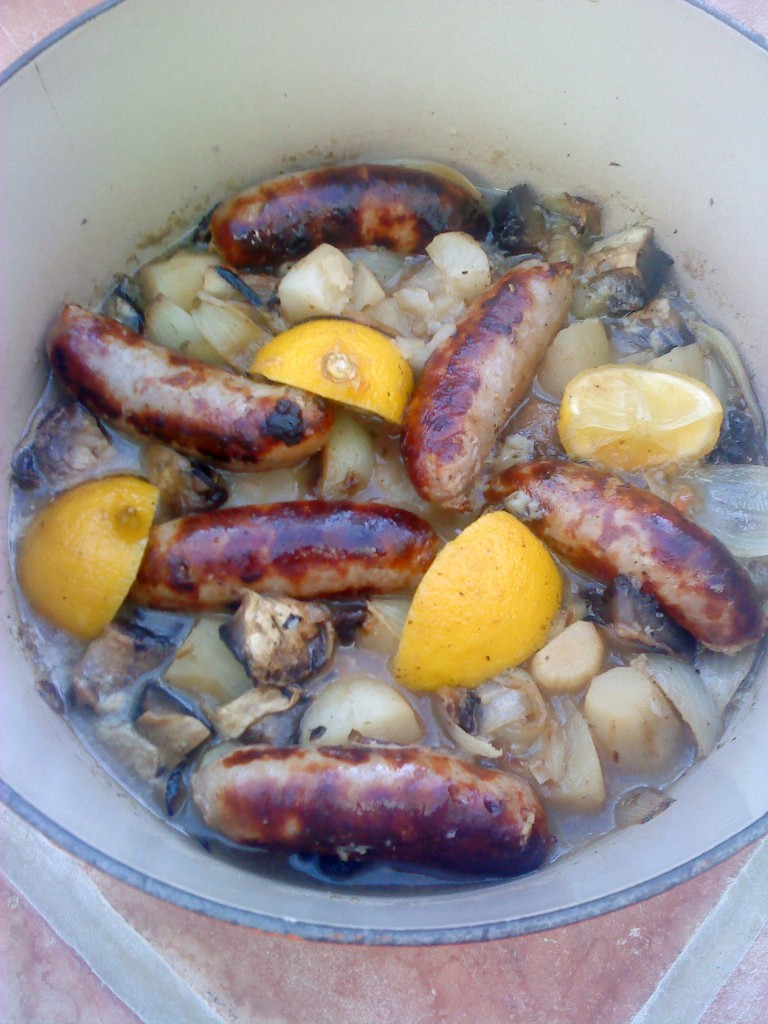
My perennial favourite is Jane Grigson’s Palestine Soup, though this is a bit of a misnomer. Veggies should leave the bacon out.
My family also like Nigel Slater’s casserole of artichokes and pork for deepest winter, which uses sausages. It sounds a bit odd but is a surprisingly good heartwarmer on a cold frosty evening.
The vegetarians among you could try Yotam Ottolenghi’s artichoke and goat’s cheese souffle or Hugh Fearnley-Whittingstall’s Roast Jerusalem artichoke, hazelnut and goat’s cheese salad.
So give Jerusalem artichokes a try. They’re flavoursome, versatile, easy to grow, should be local (if you’re living in the UK) and inexpensive. But be warned – a little goes a long way.

February 23, 2011
Oggy! Oggy! Oggy! So traditional Cornish pasties made here in Cornwall are now safeguarded by European Protected Geographical Indication status. What a mouthful.
But the delicious taste of victory could be spoilt by an undignified row about exactly how the pastry case should be crimped and precisely what should go inside it.
Personally I feel sorry for the Australians, who might now have to think what to call their so-called “Cornish” pasties. It’s a good thing they don’t export them to Europe. They’ve already had to give up marketing Australian sparkling wine as “champagne”.
Pasties are particularly popular in the Cornish Triangle or Copper Coast on the Yorke Peninsula in South Australia where Cornish miners, known as Cousin Jack, emigrated in the 19th century.
My own experience is that “Cornish” pasties made in Australia, even in the friendly and delightful South Australian town of Moonta (pictured), are a poor relation of the genuine article.
Soggy rather than oggy, unfortunately.
Update: It turns out the Australians are a little upset about this – see Cornish ruling worries Aussie pasty makers – ABC
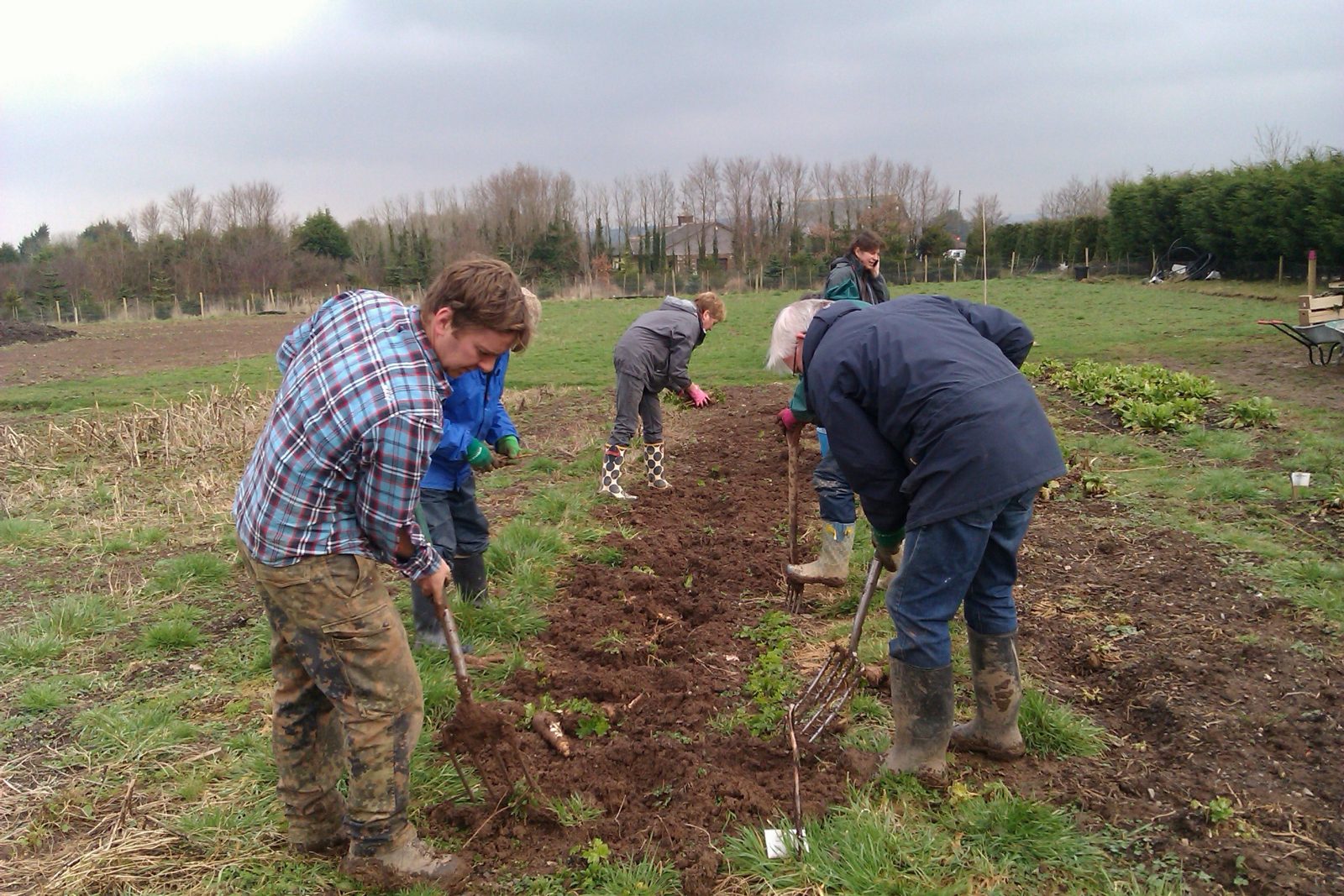
February 21, 2011
Camel Community Supported Agriculture’s volunteers have harvested the last of the parsnips for the weekly vegetable boxes.
Now we’ve dug up all the Jerusalem artichokes as well, there’s only some frost-bitten Swiss chard remaining out of what we grew last year.
At the same time we’ve planted the first of this season’s seeds in growing modules – spring onions, lettuce, onions and parsley.
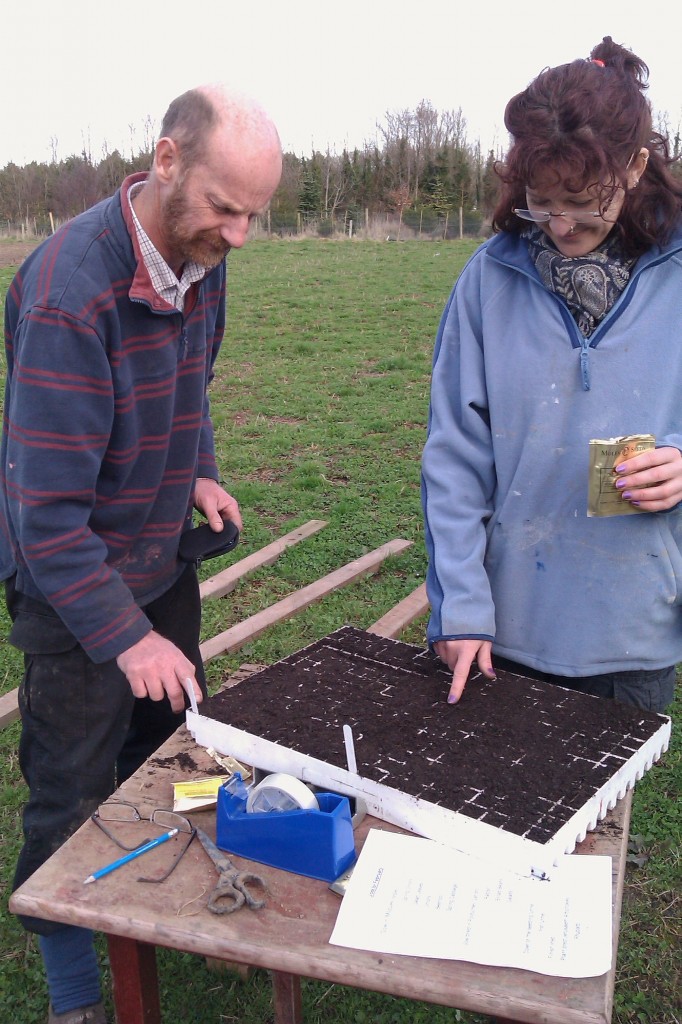

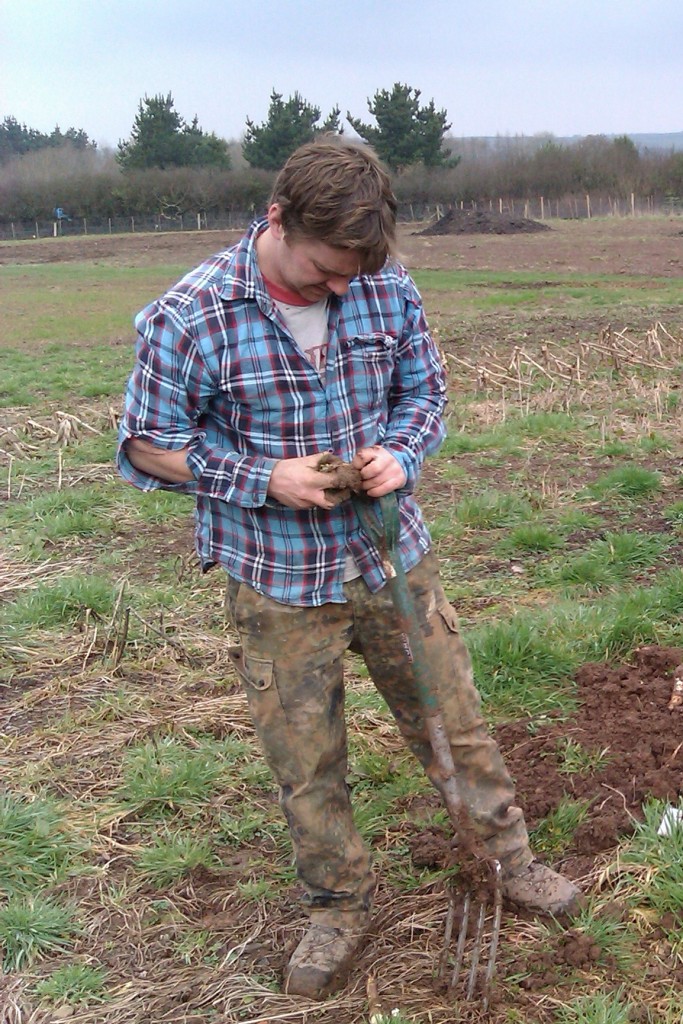
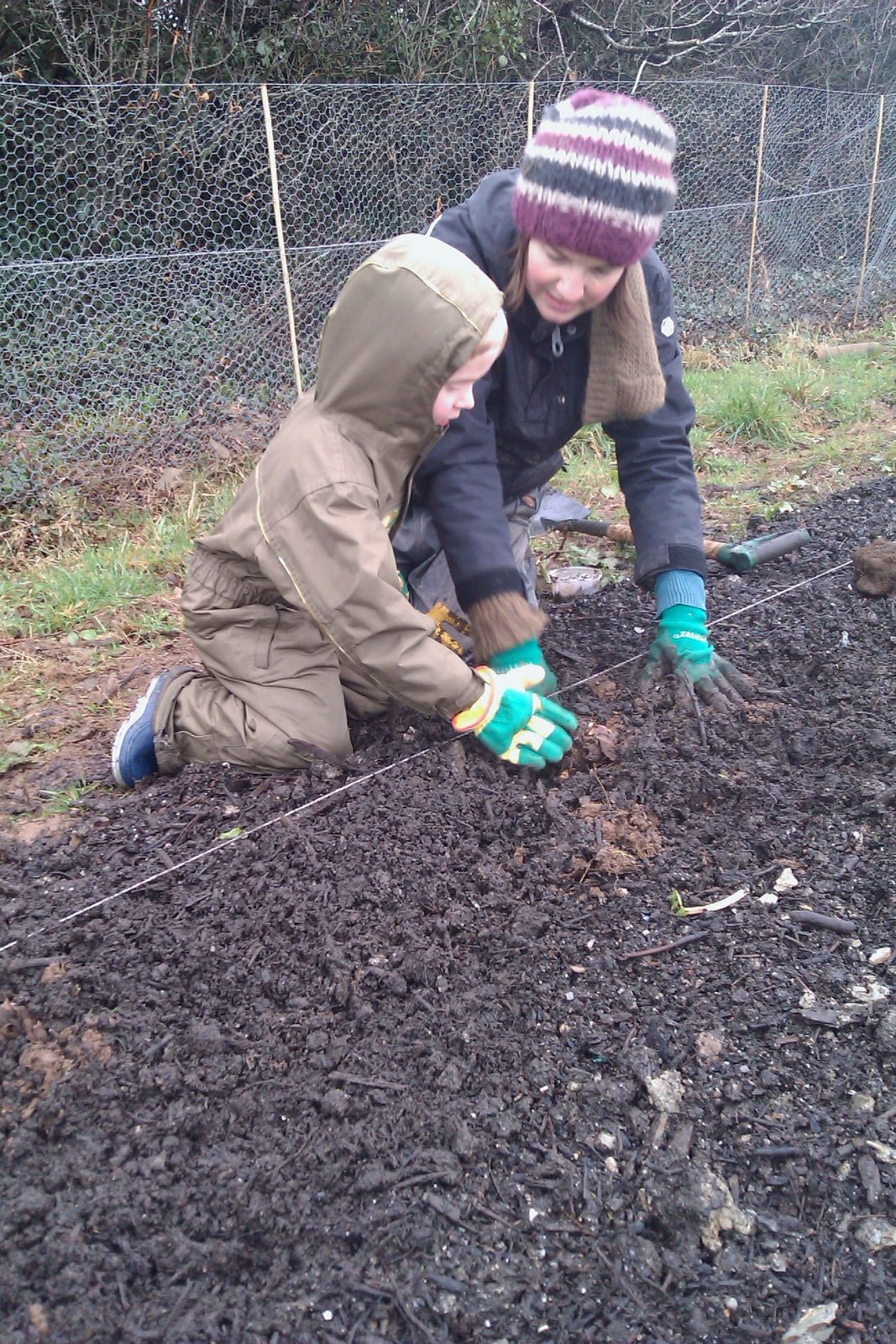
February 14, 2011
The growing team have begun digging out the dock weeds that are springing up all over our brassica plot.
Camel Community Supported Agriculture’s commitment to growing vegetables organically means no chemical sprays! So every broad-leaved dock must be painstakingly dug out by hand. We need to avoid breaking the roots, as any remaining fragments will re-sprout.
We’ve planted rhubarb in the perennial area, where we’re preparing to grow gooseberries, raspberries, globe artichokes and Jerusalem artichokes. Work also continues on the interior of the toolshed.
Thanks to expert growers Jane, Jeremy B, Mark N plus volunteers Antonina, Bob, Bridget, Cath, Charlotte, Dan, Danny, Evie, Gav, Gillian, Mark M, Mike S, Paul, Sophie, Trish F, and children Aimee, Carla, Christian, Finn, Freddie, Keira, Max, Sammy, Seth, Sophie.
